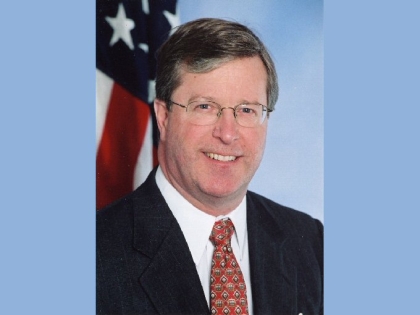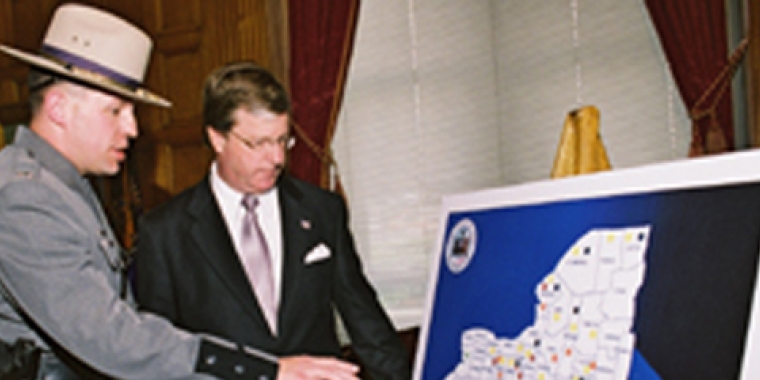
Winner pushes creation of Drug Dealer Registry
George Winner
May 12, 2010
-
ISSUE:
- Drugs

Albany, N.Y.–In the wake of a series of alarming felony drug arrests across the Southern Tier in recent weeks, and as local officials increasingly express concern over an influx of the highly addictive drug heroin into area communities, State Senator George Winner (R-C-I, Elmira) said today that he will renew the effort to enact legislation to create a state-level Drug Dealer Registry.
Winner's legislation would require convicted felony drug dealers to register with the state Division of Criminal Justice Services (DCJS) for up to 10 years. The legislation gained Senate approval in 2007 and 2008 with strong bipartisan support, but was never acted on by the Assembly.
“Our region has to continually stay on guard against the spread of meth and now there’s increasing concern locally about an influx of heroin and heroin dealers into our communities. It may be the best time to give local law enforcement agencies additional crime-fighting tools like this one,” said Winner, a member of the Senate Crime Victims, Crime and Correction Committee. “Drug dealers unravel the fabric of many communities. A Drug Dealer Registry would help our police agencies know who the dealers are, and where they are, in our communities. This heightened public awareness could give local police officers and local residents a strong tool to fight back against illegal drug trafficking and drug-related violence.”
In 2005, Winner sponsored and helped lead the effort to enact New York’s first comprehensive strategy to combat the manufacture and sale of methamphetamine in the Southern Tier and across the state. That law put in place tougher new criminal penalties to outlaw the operation of clandestine labs; promoted greater community awareness and education; protected children; and began to address the environmental dangers associated with meth labs.
Winner noted that early last week city of Hornell police, after a lengthy investigation, conducted a sweep that netted seven area residents on felony drug charges while in nearby Livingston County, county sheriff’s deputies made what’s believed to be the county’s largest-ever cocaine bust.
Ithaca Police announced yesterday that a Burdett man has been charged with felony possession of heroin following an investigation involving Ithaca and Groton police officers, Tompkins County sheriff’s deputies, and the New York State Police. At a Hornell Common Council meeting last night, Hornell Mayor Shawn Hogan shared his concerns about the rising use and sale of heroin in the city.
According to statistics from the state Department of Criminal Justice Services (DCJS), in 2009 there were 36,715 felony drug arrests statewide, including the following number in the counties comprising Winner’s district: Chemung (87), Schuyler (21), Steuben (85), Tompkins (35), and Yates (13).
Winner said that his proposal was developed with input from local law enforcement authorities, including village of Bath (Steuben County) Police Chief David K. Rouse, who first advocated the idea for a Drug Dealer Registry in 2007. He noted that over the past decade there have been consistent reports of a steadily increasing infiltration of drug dealers from large urban areas, including Rochester and New York City, into many of upstate’s small cities, towns, and villages.
Rouse said, "When I first proposed the idea of a statewide Drug Dealer Registry, I was observing my own community being overrun with individuals who were coming to Bath, setting up shop, selling illicit drugs, and taxing the already limited resources of the village and our police department. This continues to be an issue today. Drug dealers pose a threat to all citizens and their activities have a significant impact on a community's quality of life. Neighborhoods begin to rapidly deteriorate and housing values plummet. Our citizens and communities deserve better. A Drug Dealer Registry would provide valuable information to law enforcement, concerned citizens, parents, school administrators, and landlords to protect our children and the safety of our neighborhoods. Absent a Drug Dealer Registry, drug dealers can conceal their identities and criminal pasts, moving undetected from one jurisdiction to another while continuing their illicit trade. When encountered by law enforcement they provide bogus identification and their true identities are not known until they are subsequently arrested and fingerprinted."
Drug dealer registries – some of them focused solely on methamphetamine offenders -- have been proposed at the federal level, as well as in states including Maine, Minnesota, New Mexico and Tennessee. Legislators in the state of Massachusetts are also currently considering the creation of a registry similar to the one Winner is proposing.
Winner’s “Drug Dealer Registration Act” (S.4022) is patterned after New York’s Sex Offender Registry and would provide notification to local law enforcement agencies and the local community on the identity and whereabouts of convicted dealers. Under the measure, DCJS would be required to create a registry of criminals found guilty of a felony drug dealer offense in New York State. First-time offenders would be required to register for a period of five years. A 10-year registration period would be required following any subsequent convictions.
Much like the state’s existing Sex Offender Registry, the proposed Drug Dealer Registry would require the DCJS to maintain an Internet directory containing a variety of information on convicted drug dealers including the offender’s name and any known aliases, home address, expected place of domicile, photograph, offense committed, and sentence. The division would be required to forward registry information to local law enforcement agencies and, in addition to the Drug Dealer Registry web site, maintain a toll-free telephone number as another way for the public to obtain registry information.
The legislation is currently in the Senate Crime Victims, Crime and Correction Committee. It must be approved by both houses of the Legislature and signed by Governor David Paterson before becoming law.
Read more here, and share your opinion.
-30-
Share this Article or Press Release
Newsroom
Go to NewsroomWilliam K. Kastner
May 28, 2010
Memorial Day 2010
May 28, 2010


